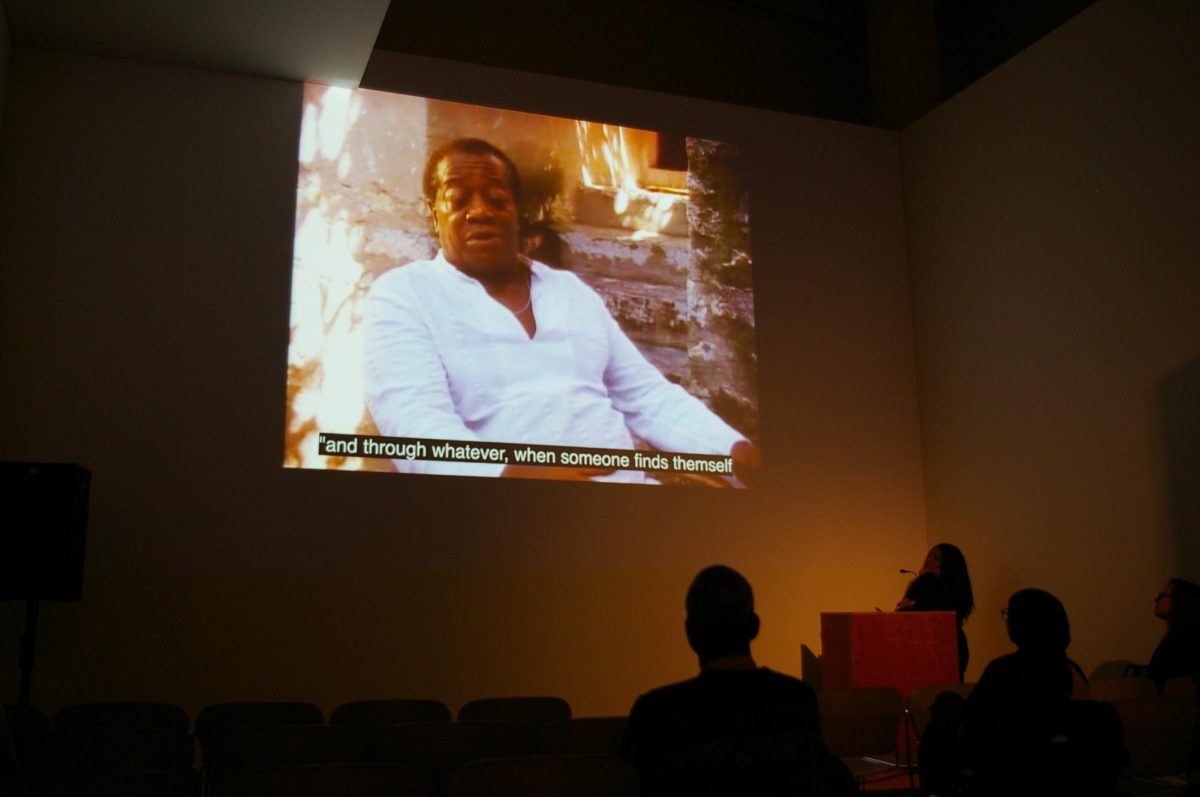The Minneapolis-St. Paul International Film Festival (M-SPIFF) officially commences its 25th year tonight with Abderrahmane Sissako’s “Bamako,” the sought after and praised investigation of Africa’s social and economic woes and the human lives caught up in them. For a touch of celebrity heft, the film’s executive producer (and “Lethal Weapon” series star) Danny Glover is scheduled to appear at the screening. Afterward, a gala at the Riverview Wine Bar will allow the first 200 festivalgoers who buy a $25 ticket the opportunity to appraise the film, Africa and world cinema at large until the bell tolls at midnight and the spell wears thin.
WHEN: April 19-29
For additional information, including a complete film list and ticketing, check out: http://mspfilmfest.org/2007/
THEATERS: Bell Auditorium, 10 Church St. S.E., Minneapolis, (612) 331-3134
Crown Block E, 600 Hennepin Ave., Minneapolis, (612) 338-5900
Oak Street Cinema, 309 Oak St. S.E., Minneapolis, (612) 331-3134
Riverview Theater, 3800 42nd Ave. S., Minneapolis, (612) 729-7369
St. Anthony Main, 219 Main St. S.E., Minneapolis, (612) 331-4723
That last statement might be a case of too-wishful thinking from a student, filmgoer and critic fervently seeking (and perhaps naïvely imagining) some long-past era of cinema purity in which quality and ethics coincided with industry demands. After all, Gavin Smith, notable film critic and editor of “Film Comment,” one of the United State’s pre-eminent film magazines, recently cited the late German director R.W. Fassbinder’s disappointment back in 1982 at the Cannes Film Festival to introduce his own lament toward this year’s Sundance Film Festival, which he called “a bloated, truly hideous cash cow.” The question we then have to ask is: With Sundance selling out, what does that mean for an infinitely smaller festival like M-SPIFF?
M-SPIFF’s 2007 opening-night appropriately – and with an eerily convenient and condemning stroke – summarizes the continuing and unfortunately woeful state of the festival and Minnesota Film Arts, the organization that makes the yearly event possible.
“Bamako” centers on a trial taking place in a housing quarter’s courtyard that interrogates the World Bank’s role in creating and furthering deficit and division in Africa (Bamako being the capital city of Mali). Included in the indictment is the western film industry and its bottom-line determination, presented in a fabricated film-within-the-film titled “Death in Timbuktu” (and here, too, Mr. Glover makes an appearance in a cameo role).
When not focusing on the trial, the film peers into the lives of those citizens living in the homes nearby, focusing on the struggling marriage of young bar singer, Melé, and her husband, Chaka. The juxtaposition between the general and the specific inevitably calls to mind the interplay between the two, such as, for instance, what implications we might draw about the film industry when a local film festival barely stays afloat.
DIRECTED BY: Abderrahmane Sissako
STARRING: Aïssa Maïga, Tiécoura Traoré and Maimouna Hélène Diarra
WHEN: Film at 7 p.m., Gala at 9:30 p.m., tonight, April 19, Riverview Theater and Riverview Wine Bar
Last year, economic peril stirred talk of the festival’s cancellation only days before opening night, and continued the paradoxical trend of a booming indie and international film market (à la “Little Miss Sunshine’s” made-for-TV marketing success story) that leaves local art houses like Oak Street Cinema – true homes to real independent, underrepresented and deserving cinema – struggling to retain audiences.
Considering that 2005’s festival screened around 140 films and 2006’s about 120, this year’s program – featuring around 80 local, national and international shorts, documentaries, features and children’s films – sounds like another verse in the prolonged swan’s song of the Twin Cities’ only major film festival.
Attend while you can, for it’s the forte of film festivals to screen some of the world’s best offerings, films that would otherwise never find distribution (read: financing) to come alight in theaters with the likes of “Spider-Man 3” and “Ocean’s 13” dominating the market. And if these festivals can’t survive? Then the next time you have the opportunity to attend a screening with Danny Glover, it’ll be for “Lethal Weapon 5!”
–Michael Garberich
Norwegian filmmaker Joachim Trier’s debut, “Reprise,” is an exuberantly youthful homage to – what else – youth and exuberance, and it pours forth with all of the ironic existentialism and stylish bravado of the early French New Wave.
Erik (Espen Klouman Høiner) and Phillip (Anders Danielsen Lie) are friends and talented, young, aspiring writers whose first novels propel them toward different women and into different fates.
Phillip travels to Paris and falls in love with a thin, dark-haired woman working in advertising named Kari (Viktoria Winge). He ends up in an asylum for six months when his love for her triggers his psychosis. When he leaves he struggles to express a complete thought, ending his future as a novelist.
DIRECTED BY: Joachim Trier
STARRING: Espen Klouman Hoiner, Anders Danielsen Lie and Christian Rubeck
PLAYING AT: 7 p.m. Saturday, April 21, St. Anthony Main and 4:30 p.m. Sunday, April 22, St. Anthony Main
The cult status of Erik’s first novel brings him literary frustration as he struggles to make a career out of literature, appearing on talk shows, dealing with editors and attending parties, estranging his long-time girlfriend in the process.
Trier’s debt to François Truffaut’s “Jules and Jim” is evident within the first five minutes as he launches into a dauntingly condensed voiced-over catalogue of information, projecting the possible futures of Erik and Phillip upon the reception of their novels before snapping back into the present. Like Truffaut, Godard and the other Cahiers alums, Trier’s film is all about time: recapturing it, spending it and getting through it.
DIRECTED BY: Rolf de Heer
STARRING: David Gulpilil and Jamie Gulpilil
PLAYING AT: 9:15 p.m. Friday, April 20, Bell Auditorium and 12:30 p.m. Sunday, April 22, Oak Street Cinema
He freezes the frame, annuls and reimagines his predictions and stylishly splashes text on the image recalling Godard’s more playful side, when he wasn’t being overtly and passionately anti-capitalist.
“Reprise’s” masterful photography waters the eyes with every square centimeter of Oslo’s chic apartments, the blasé yet vibrant cosmopolitan pulse of Paris’ cafés and the cool, jetty-strewn beaches along Oslo’s western peninsula region, Bygdøy.
From inspired start to syncopated finish, it’s cleverly conceived and executed, and more than worthy of the camera d’or (award for best first film) it won last year at Cannes.
–Michael Garberich
2006 saw the release of several films featuring the extensive use of endangered languages. But where something like “Apocalypto” flexed big-budget machismo that was ultimately overshadowed by its director’s drunken, public, anti-Semitic rants (cough cough), Australia’s “Ten Canoes” is a small-scale but uniquely woven and artfully made love letter to indigenous Ganalbingu speak and Australian Aboriginal culture.
For the follow-up to his 2002 film “The Tracker,” an exploration of modern Aboriginal life, director Rolf de Heer travels back to lands left gorgeously untouched by European invasion to tell his parable of forbidden love amid rampant tribal warfare.
Originally inspired by a photograph of 10 men in their bark boats shown to de Heer by actor David Gulpilil (an Aboriginal icon and the film’s narrator/star), “Ten Canoes” follows such a group of natives in search of food on the Arafura swamp. At the center is the shrewd, lustful young warrior Dayindi (Jamie Gulpilil), who desires one of his elder brother’s wives. While helping construct said canoes, he is told a story of murder and betrayal that could mirror his own if he’s not careful.
What follows is a darkly funny glimpse into the sweet and sour aspects of small societies – yes, you’re looked after, but you have constant responsibility, absolutely no privacy and everyone always knows what you’re thinking. In other words, when you’re diggin’ on your brother’s woman, you’ll likely be subjected to humiliation and, on occasion, sorcery.
The tragicomedy antics of “Ten Canoes” are delivered in such an authentic manner (and against so many breathtaking backdrops) that Western audiences might lose themselves in de Heer’s brand of unconventional storytelling – beneath the surface is a subtle, but strong, promotion of tolerance and understanding between even the most opposite of groups, but nearly unreadable subtitles and a bouncy narrative threaten to blur the political message. However, if viewed with patience and an open mind, the appealing, pioneering cultural vision of “Ten Canoes” becomes clear.
–Haily Gostas
From the far reaches of the globe – the rugged lands of Mongolia, the Amazon Rainforest and the Tenere Desert of Niger – three groups of soccer enthusiasts brave the harsh worldly, elements for one sole purpose: to watch the 2002 World Cup Final of Germany vs. Brazil.
In spite of their remote conditions (in some cases, working televisions are hundreds of miles away) and minor snags (obnoxious Christian missionaries and the difficulty of climbing up to the forest canopy to hold up a DIRECTV satellite) all three groups – somehow, some way – manage to wrangle themselves in front of a tattered pleasure box just in time to catch the game (and buy a page of Playboy from a peddler for real cheap.)
“The Great Match” is about as quirky and lovable as any indie film on cross-cultural frolics, with none of the fatalistic melodrama of “Babel.” The film stays true to the lush, visceral scenery of these very different regions while capturing the comically endearing spirit of the indigenous people who carry the story.
Globalization has never been so endearing.
–Sara Miller
Although not as kinky and loin-rousing as its title would suggest, “The Pervert’s Guide to Cinema” whips up a lasciviously compelling argument for film as the ultimate Peeping Tom.
DIRECTED BY: Sophie Fiennes
STARRING: Slavoj Zizek
PLAYING AT: 4:45 p.m. Friday, April 20, Bell Auditorium
Directed by Sophie Fiennes (sister of actor Ralph Fiennes, who played the hunky burn victim in “The English Patient”), the Euro “Schoolhouse Rock” for adults begins with a frenzied splicing of Rorschach ink blobs flashing onscreen as orgasmic shrieks and industrial baselines carve out background noise. A mysterious man named Slavoj appears onscreen. As he stares at the camera from the top of a wishing well, he proclaims, “Cinema is the ultimate pervert art. It doesn’t give you what you desire, it tells you how to desire.”
And it’s all down the rabbit hole from there. Slavoj Zizek – a bearded, effervescent philosopher and psychoanalyst who taught at the University in the nineties – takes viewers on a psychic tour of some of the best modern classics for but one humble purpose: sex. Or, rather, the art of cinematic mind-screwing.
Throughout the film, Zizek places himself in original movie locations (the mother’s cellar from “Psycho”) and replica sets (he recreates the boat scene from Hitchcock’s “Birds” with stunning accuracy) all while taking esoteric subjects (symbolic order and oceanic feeling, anyone?) and deconstructing them into deep-fried and digestible montages on fantasy and cinematic fondling.
Sadly, our world might be nothing but a limp, unfinished reality centered on the preservation of the male penis, but in “The Pervert’s Guide to Cinema,” the tortured human psyche has never seemed so thrilling.
–Sara Miller
“The Memory Thief,” director Gil Kofman’s first feature film, tells the uncomfortable but captivating tale of a young man who tries to find meaning for his own life through the suffering of others.
DIRECTED BY: Gil Kofman
STARRING: Mark Webber, Rachel Miner and Jerry Adler
PLAYING AT: 9:15 p.m. Saturday, April 28, Bell Auditorium
The man, played by Mark Webber, turns a chance encounter with a concentration camp survivor into the defining moment of his young and lonely life.
The film intimately follows Webber’s downward spiral from a mild curiosity about the Jewish way of life to a full-fledged obsession with survivors’ stories.
As the lonely young man’s demise burns on, disturbing facts about his life only add fuel to the flame. The comatose mother he has been visiting throughout the film turns out not to be his mother. There is no explanation of who this woman is or why Webber’s character has latched onto her and the ambiguity adds a layer of frustration to the storyline for both the man and the audience.
While maintaining a deeply somber and foreboding tone, “The Memory Thief,” does manage to draw some fleeting smiles. The main character’s visit to his neighbor’s first grade class to discuss his life, which by this point has been thoroughly consumed by his obsession, is painfully funny.
DIRECTED BY: Bohdan Slama
STARRING: Tatiana Vilhelmova and Pavel Liska
PLAYING AT: 5 p.m. Tuesday, April 24, Oak Street Cinema and 5:15 p.m. Thursday, April 26, St. Anthony Main
The highlight of this film is the haunting ending, which, while leaving strings untied, suddenly becomes the only way the film could end. He has completed his transformation and eerily limps into the distance, accompanied by the stolen memories he has made his own.
–Megan Kadrmas
“Something Like Happiness” is anything but a happy movie. Sad? Yes. Depressing? Slightly. Bleak? Definitely.
This Czech film by noted director Bohdan Slama (“Wild Bees”) beautifully incorporates the stark and harsh landscape of the Czech Republic into his tale about young people making heavy decisions.
“Something Like Happiness” follows girl-next-door Monika (Tatiana Vilhelmova) through her day-to-day life as she readies herself to join her boyfriend in California.
All plans are delayed, however, when her good friend (a young single mother of two adorable but rowdy boys) goes off the deep end and stops caring for her children, forcing Monika and childhood friend Tonik (Pavel Liska) to step in to care for the children.
The film does have its moments of lightheartedness, like the unexpectedly touching scene where Tonik and Monika’s fathers get ridiculously drunk together on Christmas. However, like the harsh Czech scenery that reflects the tone of this film so well, “Something Like Happiness” is complex, at times frustrating and in the end, heartbreaking.
–Megan Kadrmas
Leisure fever ran high in a small Swedish town, especially to a cluster of lonely young men forced to come of age in a place saturated with senior citizens. As they go about their lazy summers, pondering whether to go home and eat cake batter or go shrooming in the wilderness, one guy starts burglarizing houses in order to fulfill his dream of operating a Bed and Breakfast.
DIRECTED BY: Jesper Ganslandt
STARRING: Jon Axel Eriksson, Holger Erikson, David Johnson and Jorgen Svenson
PLAYING AT: 9p.m. Friday April 20, St. Anthony Main and 5 p.m. Monday April 23, Oak Street Cinima
“Falkenberg Farewell,” directed by first-time director Jesper Ganslandt, is a contemplative piece on the memories of childhood, friendship and the uncertain steps we often take toward our oncoming lives. The dialogue is thoughtful and highly improvisational, and the nuanced camera shots and spanning scenery makes you feel like you’re in the middle of God’s country.
–Sara Miller
These days, the art of putting family dysfunction on film, especially within a seemingly idyllic suburban setting, can be more of a bloated cliché than a tantalizing exposé.
DIRECTED BY: Lanre Olabisi
STARRING: Ian Alsup, Dennis Green, Joy Merriweather and Kerisse Hutchinson
PLAYING AT: 7:15 p.m. Tuesday, April 24, Oak Street Cinema and 3 p.m. Saturday, April 28, St. Anthony Main
Every so often, however, the attempt is quiet, honest and riveting in its unpretentiousness. Rather than stabbing for the sweeping histrionics of “American Beauty”-type Oscar darlings, these films are more comfortable painting familiar depictions of everyday drama – and often hit home far more so than their overtly grandiose counterparts.
Lanre Olabisi’s “August the First” refers to the date on which Tunde’s (Ian Alsup) graduation celebration finally falls, after being put off all summer in order to coordinate with a surprise guest’s schedule – his estranged Nigerian father Dipo (Dennis Green). Though a scant few welcome him back with open arms, the general party populace can’t let go of Dipo’s untimely exit years ago, which left his alcoholic wife Rhonda (Joy Merriweather) with three children to raise and a developing case of breast cancer.
Tunde, who has left his family and friends under the impression that he will attend business school, wants to uproot to Nigeria to join his father. Dipo, on the other hand, wants to move his new wife and children to the States but needs the financial assistance to do so.
Sure, there are a few obvious twists and turns, but this engaging ensemble drama stays well afloat with a finely-tuned means of storytelling and excellent, naturalistic performances. The result is small but striking – a family portrait able to prove immense power in the face of all life’s little devastations.
–Haily Gostas
“Warchild” (“Stille Sehnsucht”), a Serbo-Croation and German film with English subtitles, takes a look at Eastern Europe in the aftermath of the wars of the ’90s. But rather than making the film into an extended political exposé, veteran German director Christian Wagner gives the films a human touch by focusing on mothers’ love, and what it means to be a family.
DIRECTED BY: Christian Wagner
STARRING: Labina Mitevska, Senad Basic and Otto Kukla
PLAYING AT: 7 p.m. Wednesday, April 25, Bell Auditorium
A decade after the end of hostilities, Senada (Labina Mitevska) is still trapped in Bosnia. Her daughter Aida has been missing for nine years – since she was two – but Senada hasn’t given up hope of finding her.
When a magazine article renews Senada’s hope of a reunion, she smuggles herself into Germany to track down her daughter, who might have been rescued and given up to Germans for adoption.
Can she actually succeed in finding her? And if she does, what does her relationship to her daughter consist of almost a decade later and with no shared memories to bind them?
It helps to know something of recent European history when engaging with the film, but the human story that lies at its core gives the film a grim universality that sustains it even through some uneven pacing issues. And thankfully, Wagner’s barren images and gray portraits don’t attempt to answer any questions – they’re content merely to raise them.
–Matt Graham
“The Bothersome Man” begins in an expansive Norwegian nowhere reminiscent of Wim Wenders’ 1984 film “Paris, Texas.” A scruffy man named Andreas (Trond Fausa Aurvaag) exits a white and blue Mercedes coach bus in a sullied suit and baseball cap. He’s expressionless and lost, and viewed in this wide-open transit stop from a great, isolating distance. But this rich cinematography is as affectless as its reticent main character, and it quickly loses sight of the story it tries to tell, essentially opting for a collection of off-beat and uninspired misfortunes.
DIRECTED BY: Jens Lien
STARRING: Trond Fausa Aurvaag and Petronella Barker
PLAYING AT: 9:30 p.m. Monday, April 23, Oak Street Cinema and 5 p.m. Tuesday, April 24, St. Anthony Main
A sign written on a cloth stretched above a shed reads “Welcome” and a man arrives in a car and takes Andreas to a grey, nondescript metropolis where he is promptly shaved, suited and assigned a position in accounting.
Steel, concrete and computers replace Wenders’ dirt and brush in the unnamed city. Here, food has no taste, alcohol has no effect, men and women seem uninhibited by sexual promiscuity and when Andreas loses his finger in a paper cutter, there’s a lot of blood but none of Andreas’ co-workers seem too concerned (it grows back the next day). It’s a city of infinite pleasures void of any sort of physical sensation.
Although the film looks pretty (doubtlessly due to some heavy digital post-production), the quirky allegorical tale it tells is too inconsistent to keep your attention. At times, you feel as if you’re watching one long over-stylized commercial, despite its obvious critique of a too rigidly bureaucratic system of management.
Still, there’s something indelibly attractive about watching a man allow a train to run over him multiple times, only to return to his girlfriend, grossly bloodied and broken-boned, and have her calmly inform him of the dinner party she’s planned.
–Michael Garberich
Anyone familiar with “The State” and its offspring – “Wet Hot American Summer,” “The Baxter” and Comedy Central’s short lived “Stella” – will have an idea what to expect from “The Ten,” the new film by David Wain. That being said, the film is bound to be quite unlike (almost) any comedy you’ve ever seen.
DIRECTED BY: David Wain
STARRING: Paul Rudd, Winona Ryder and Justin Theroux
PLAYING AT: 7 p.m. Sunday, April 29, Crown Block E
Wain comes from a generation of American improv comedians brought up on a mix of “Monty Python” and old “SNL” – a generation that includes “Mr. Show’s” cast, Conan O’Brien and most of the writers from the glory days of “Seinfeld” and “The Simpsons.” He shares that generation’s penchant for short attention spans and random pop-culture lampoonery, all done with tongues planted so firmly in cheeks that one sometimes wonders how the actors articulate their words.
“The Ten” uses its brief 93-minute runtime to string together 10 stories, each one based on a different Biblical commandment. Each tale is complete unto itsself, and attempts to compress all the highs and lows of a feature length film into a span of less than 10 minutes. But as the film progresses, the tales overlap as bit characters from earlier skits show up as the protagonists in later ones. The stories are united by narrator Paul Rudd, who stands before two gigantic stone tablets and introduces each bit as he gradually progresses through his own extramarital affair.
WHEN: 9:30 p.m. Wednesday, April 25
WHERE: Stub & Herbs, 227 Oak St. S.E., Minneapolis
WHAT: Following the Minnesota Shorts, the local filmmakers will be in attendance and the group AFTERALL will perform.
WHEN: 11:30 p.m. Thursday, April 26
WHERE: Barbette, 1600 W. Lake St., Minneapolis
WHAT: How else can you celebrate the screening of “The Godfather of Disco?” Barbette hosts the boogie-ing and oogie-ing, featuring a ’70s dance party with the director, Gene Graham, in attendance. There will also be a “Death by Disco” costume contest.
WHEN: 7 p.m. Friday, April 27
WHERE: Gallery13, 302 Thirteenth Ave. N.E., Minneapolis
WHAT: “The Memory Thief” director Gil Kofman will be at Gallery13 along with music by Mayda, hors ‘devours and cocktails.
WHEN: 8:30 p.m. Sunday, April 29
WHERE: Bellanotte, 600 Hennepin Ave., Minneapolis
WHAT: After the screening of “The Ten,” enjoy a dinner buffet from Bellanotte, with music from Irish artists Fran King and Duncan Maitland.
Highlights include the “Though shall not steal” story, which features Winona Ryder falling madly in love with a wooden ventriloquist’s dummy, and “Thou shall not covet thy neighbor’s goods,” in which two suburban dads give up everything to see who can amass the most CAT scan machines.
Rob Corddry, Jessica Alba, Liev Schreiber, Famke Janssen and the cast of “Reno: 911!” all have brief, hilarious cameos. Justin Theroux is especially ridiculous as a Jesus who can’t get around to ending the world because he’s too busy with another kind of, ahem, second coming.
It can be a risky proposition when sketch comedy folks try to make a movie. But by assembling a collage of sketches, David Wain succeeds like no such film since the glory days of the Pythons, right down to the movie’s final scene, a musical number that ties the whole thing together and bares more than a little resemblance to “The Life of Brian’s” closing rendition of “Always Look on the Bright Side.”
–Matt Graham
















